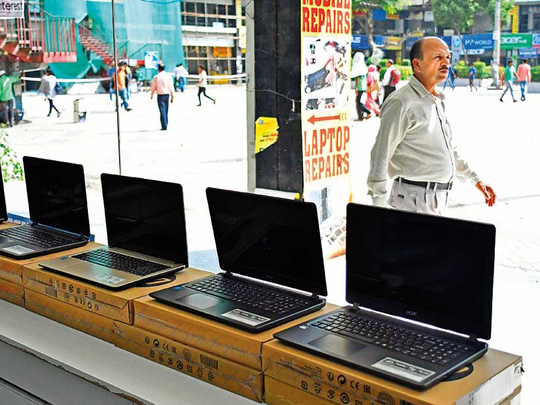
New Delhi, Mumbai, Kolkata: Confusion and uncertainty swept through India’s $2 trillion economy as businesses and consumers alike attempted to navigate a new nationwide sales tax that replaced a spiderweb of more than a dozen state and territory taxes and levies.
The new Goods and Services Tax (GST), formally ushered in at a late-night session of parliament overnight Friday, unifies 29 states and 1.28 billion people into a single market for the first time.
It’s expected to expand India’s narrow tax base and increase government revenues and will count as the most important economic reform of Prime Minister Narendra Modi’s three-year-old administration. The government expects the unified tax structure to improve the ease of doing business in India and boost foreign investment.
“This will lead to increased compliance and give us an opportunity to make tax rates more reasonable, apart from leading to higher collections and providing strength to the economy,” Finance Minister Arun Jaitley told a packed indoor stadium comprising accountants in New Delhi on Saturday. “It is my belief that there will be some pain when there is a change and one where technology is involved.”
Treading carefully
On the first day of its implementation, many shops were closed and consumers stayed away in droves, deterred by the change in prices and uncertainty over how the tax would work.
Car dealerships across the country were taking time to adjust to the new regime, with some saying they had not received revised prices under the GST and could not record any sales billings.
“We are not selling cars now because we are yet to get revised pricing details from Maruti,” said M. Mukhopadhyay, the chief executive officer of Auto Hi-Tech Pvt Ltd., which sells cars from auto giant Maruti Suzuki India Ltd. “We are telling customers that there will be a price difference, but if they are willing to book a car now, then we are taking bookings.”
A Maruti Suzuki spokesman said on Saturday the company had since communicated the revised prices to dealers.
“It’s like the day after demonetisation.” said Praveen Arora, 35, who runs AVM Computer at Nehru Place in the capital New Delhi, referring to the government’s sudden decision in November last year to withdraw 86 per cent of the country’s currency from circulation. “People are confused. And the way the rates of IT products have been raised, it’s hit sales very hard — people are expecting to be billed at the old rates.”
Businesses are also put off by the GST’s complicated structure, which includes four tax slabs ranging from 5 per cent to 28 per cent as well as numerous exemptions. And it’s not clear what sort of damage the nationwide roll out will inflict on the country’s economy before the long-term benefits kick in.
Early slowdown
In the Mughal-era Chandi Chowk market in Delhi, spice wholesaler Sanjay Khandelwal had not processed a single sale on Saturday, even though tax rates on his spices remain the same and he’s enrolled in the GST Network.
Retail buyers are worried, he said, because they’re unsure about the new system and there’s talk of police checking the trucks of merchants who have bought from wholesalers like him. “Today the shop is empty,” the 32-year-old said. “Our customers are scared of being harassed by the police.”
At one of the oldest shops in Delhi’s upmarket Connaught Place business district, Baluja’s Shoes owner Vijay Mehta is weighing the short-term impact on his business. “It’s easier for someone like me with three accountants to help, but the smaller traders are definitely going to have a tough time,” Mehta said.
Meanwhile, at Max Cinemas in Mumbai, Shabu Bhargavan, 32, was shocked to be provided with a small, white scrap of paper with his seating details scribbled in blue pen when he went to book tickets for a film.
The server’s been down since June 30 while the system is upgraded for the new tax, reception staff told him, so all ticketing was being done by hand.
Growth potential
Despite the initial hiccups, the economy stands to benefit over the long term as efficiency gains and higher government revenues translate into stronger growth potential, Kotak Institutional Equities wrote in a note on June 27.
“We would be cautious on economic growth for next one to two quarters,” the note reads. “The GST rate structure will be neutral to marginally disinflationary for CPI. We estimate CPI inflation to be lower by around 20 bps on an average due to GST rates.”












